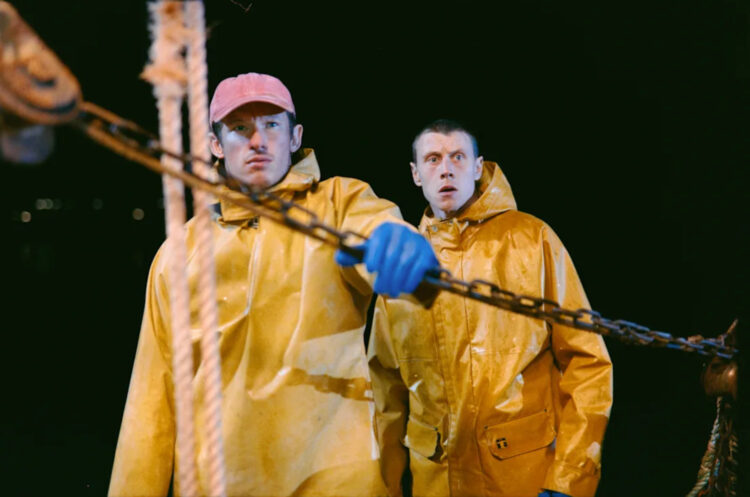
The films of Mark Jenkin ooze a hypnotic, seasick sensibility; to watch them is to be lulled by their restless jumps through time and space, their ability to convert his home turf of Cornwall into a suspended world where facts and visions collide in stupefying dioramas. The director is a spinner of wandering tales, never fueled by linear plots so much as ambient forces: a ticking clock, gusts of wind, the distant roaring of waves. His dramas tend to pull your gaze from people and toward the inanimate objects that litter their surroundings. It’s here––in the interstice between the fictional foreground and non-fictional background––that the actual story often lies.
It stands to reason that his latest, Rose of Nevada, should begin not with a face but a series of textures: an extreme close-up of a seawall, an anchor candied in rust, chains, boats, and two boots on a pier––Mike’s (Edward Rowe), among the last folks still living in a seaside Cornish ghost town. The region’s rampant depopulation has long been a staple of the filmmaker’s oeuvre, routinely focused on how its native residents have been pushed away by rising costs, unchecked tourism, and gentrification. That was the narrative catalyst behind Jenkin’s terrific 2015 short Bronco’s House, in which a young man returns to his village and struggles to find affordable lodging, and it set in motion his 2019 breakthrough feature Bait, where a fisherman clashes with the vacationing Londoners who’ve bought his childhood home and relegated him to the town’s periphery.
That same force propels Rose of Nevada, in many ways a summation of Jenkin’s preoccupations with the disappearance of Cornwall’s traditional lifestyles and the extent to which local communities can withstand the loss. As the titular fishing boat magically appears at the old harbor, some 30 years after being lost at sea with all hands, Mike recruits a three-man team to ship it back out in hopes it’ll bring new luck to the spectrally empty hamlet. Nick (George MacKay) enlists to provide for his wife and daughter; Liam (Callum Turner) sees the gig as a change to escape his past. They’re joined by skipper Murgey (Francis Magee), a crusty sailor more than twice their age. But no sooner do they return home after the first trip that something feels amiss––the journey has yanked them back in time and the village welcomes them as if they were the original crew.
This is nothing exactly novel. Even when ostensibly set in the present, Jenkin’s works all seem to exist in some undetermined past, and in Rose of Nevada, a few objects adorning Nick’s room––an old poster, a tape player, some cassettes––suggests a bygone era long before the boat catapults him back to the early 1990s. But nothing heightens that anachronism more than the film’s look. Jenkin shot Rose of Nevada on film with the same camera he used for Bait and its follow-up, Enys Men: a clockwork Bolex H16 with a maximum runtime of 28 seconds per take. Though a lot more polished than they were in the monochrome, hand-processed Bronco’s House and Bait, the images are similarly rife with scratches and red-light leak flashes. To call those aberrations, however, would be grossly misleading; these irregularities define Jenkin’s aesthetic, the main reason why his films feel so mysteriously alive.
While most other filmmakers would have turned the choice to shoot on celluloid into an exercise in cinematic nostalgia, there is nothing stuffy about Jenkin’s approach. I am not sure I can translate the entrancing feeling I experienced as the Rose of Nevada kept crossing the ocean, borne back dreamily into the past, or the film’s aural and visual alchemy––how the deafening clanging of the ship’s cranes melded with the weathered images of the men at sea and people waiting for them at home. But I know my response has plenty to do with the peculiar tactility those frames exuded, the sense that what I was watching was no mere relic but a work that testified to the medium’s materiality and vitality. Seen from the vantage point of our hyper-digital 2020s, Jenkin isn’t just a stark outlier from the current media regime. He’s also among the very few working directors whose cinema feels both familiar and viscerally new.
Rose of Nevada premiered at the 2025 Venice Film Festival.
The post Venice Review: Mark Jenkin’s Rose of Nevada is a Stupefying, Time-Slipping Ghost Story first appeared on The Film Stage.
from The Film Stage https://ift.tt/YXkb1jF



0 Comments